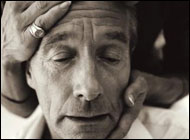The Psychiatric Dimension of Epilepsy
There was a time when epilepsy was not clearly distinguished from psychiatric disorders. Researchers eventually clarified the origins of epilepsy in the brain. Still, epileptic seizures are a brain malfunction, and so are major depression, anxiety disorders, and psychoses. While epilepsy is no longer considered a psychiatric disorder, its psychiatric dimension is important for treatment and research, reports the May issue of the Harvard Mental Health Letter.
The symptoms of simple epileptic seizures can be mistaken for psychiatric symptoms such as panic attacks or flashbacks. Psychiatric symptoms may also resemble epilepsy. An examination to determine whether there is epileptic brain activity is the best method for making the correct diagnosis.
“But the connection between epilepsy and psychiatric disorders involves more than overlapping symptoms and mistaken diagnoses,” says Dr. Michael Miller, editor in chief of the Harvard Mental Health Letter.
“More than a quarter of people with epilepsy have psychological symptoms that may require treatment, and up to 10% of patients in psychiatric hospitals have epilepsy,” he says. Sometimes psychiatric symptoms are a reaction to epilepsy. But dysfunction in the same brain structures may cause both the seizures themselves as well as changes in mood and thinking between seizures. And treatments that are helpful for epilepsy are frequently helpful for psychiatric disorders.
Often, people with epilepsy are not diagnosed with or treated for psychiatric disorders. One reason is that the symptoms may not look typical. Another reason is that some doctors are not convinced that psychiatric drugs will work for patients with epilepsy. And some psychiatric drugs increase the risk of seizures. The Harvard Mental Health Letter notes that as the research paths of psychiatry and neurology converge, the understanding and treatment of epilepsy-related depression, anxiety, and psychoses should improve. 
Also in this issue:
- Drug treatment of bipolar disorder
- Limits of psychotherapy for treating depression in children
- Aging and personality
- A doctor discusses: Caregiver stress
The Harvard Mental Health Letter
Revision date: June 18, 2011
Last revised: by Andrew G. Epstein, M.D.